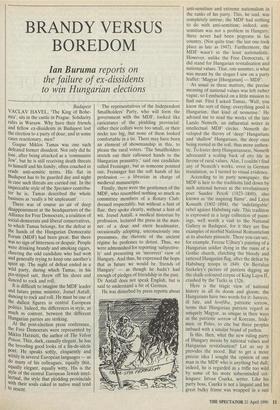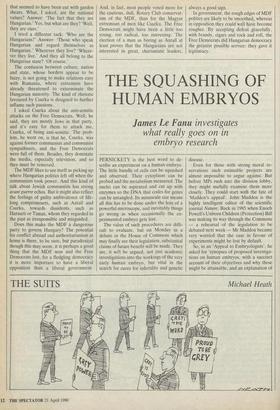BRANDY VERSUS BOREDOM
Ian Buruma reports on
the failure of ex-dissidents to win Hungarian elections
Budapest VACLAV HAVEL, 'The King of Bohe- mia', sits in the castle in Prague. Solidarity rules in Warsaw. Why have their friends and fellow ex-dissidents in Budapest lost the election to a party of dour, and in some cases reactionary, men?
Gaspar Miklos Tamas was one such defeated former dissident. Not only did he lose, after being attacked as a 'communist Jew', but he is still receiving death threats to himself and his family, often couched in crude anti-semitic terms. His flat in Budapest has to be guarded day and night in case such threats are carried out. In the impeccable style of the Spectator contribu- tor he is, Tamas described the whole business as 'really a bit unpleasant'.
There was of course an air of deep disappointment at the headquarters of the Alliance for Free Democrats, a coalition of social-democrats and liberal conservatives, to which Tamas belongs, for the defeat at the hands of the Hungarian Democratic Forum (MDF) had been great. But there was no sign of bitterness or despair. People were drinking brandy and smoking cigars, cheering the odd candidate who had won and generally trying to keep one another's spirit up. The night of defeat ended in a wild party, during which Tamas, in his pin-striped suit, threw off his shoes and danced to rock and roll.
It is difficult to imagine the MDF leader and future prime minister, Jozsef Antall, dancing to rock and roll. He must be one of the dullest figures in central European politics. Indeed, the differences in style, as much as content, between the different Hungarian parties are striking. At the post-election press conference, the Free Democrats were represented by Miklos Haraszti, the author of The Velvet Prison. Thin, dark, casually elegant, he has the brooding good looks of a fin-de-siècle poet. He speaks softly, eloquently and wittily in several European languages — as do many of his colleagues, equally thin, equally elegant, equally witty. His is the style of the central European Jewish intel- lectual, the style that plodding provincials with their souls caked in native mud tend to resent. The representatives of the Independent Smallholders' Party, who will form the government with the MDF, looked like caricatures of the plodding provincial: either their collars were too small, or their necks too big, but none of them looked comfortable in a tie. There may have been an element of showmanship in this, to please the rural voters. 'The Smallholders stretch out their calloused hands to the Hungarian peasantry,' said one candidate called Freisinger, but as someone pointed out, Freisinger has the soft hands of his profession — a librarian in charge of medieval manuscripts.
Finally, there were the gentlemen of the MDF, who resembled nothing so much as committee members of a Rotary Club: dressed respectably, but without a hint of flair, they spoke clearly, without a hint of wit. Jozsef Antall, a medical historian by profession, lectured the press in the man- ner of a dour and stern headmaster, occasionally adopting, unconsciously one pressumes, the rhetoric of the ancient regime he professes to detest. Thus, we were admonished for reporting 'subjective- ly' and presenting an 'incorrect' view of Hungary. And thus, he expressed the hope that in future we would be 'friends of Hungary' — as though he hadn't had enough of pledges of friendship in the past. Dr Antall does not speak English, but is said to understand a bit of German.
He was disturbed by press reports about anti-semitism and extreme nationalism in the ranks of his party. This, he said, was completely untrue; the MDF had nothing to do with anti-semitism; indeed, anti- semitism was not a problem in Hungary; there never had been pogroms in his country. (Not quite true: the last one took place as late as 1947). Furthermore, the MDF wasn't in the least nationalistic. However, unlike the Free Democrats, it did stand for Hungarian revitalisation and national values. That, one assumes, is what was meant by the slogan I saw on a party leaflet: 'Magyar [Hungarian] — MDF'.
As usual in these matters, the precise meaning of national values was left rather vague, so I embarked on a little mission to find out. First I asked Tamas, 'Well, you know the sort of thing: everything good is Hungarian, that kind of nonsense.' He advised me to read the works of the late Lazslo Nemeth, an influential writer in intellectual MDF circles. Nemeth de- veloped the theory of 'deep' Hungarians and 'shallow' Hungarians, the deep ones being rooted in the soil, thus more authen- tic. To foster deep Hungarianness, Nemeth advocated a scaling back of city life in favour of rural values. Alas, I couldn't find any of Nemeth's works, even in German translation, so I turned to visual evidence.
According to its party newspaper, the MDF is heir to the traditions laid down by such national heroes as the revolutionary poet Sandor Petofi (1823-1849), also known as 'the inspiring flame', and Lajos Kossuth (1802-1894), the 'indefatigable' rebel against Habsburg rule. This tradition is expressed in a large collection of paint- ings, well worth a visit to the National Gallery in Budapest, for it they are fine examples of morbid National Romanticism at its absolute pinnacle. There you can see, for example, Ferenc Ujhazy's painting of a Hungarian soldier dying in the ruins of a Gothic church, clutching the bloody and tattered Hungarian flag, after the defeat by Habsburg troops in 1849. Or Bertalan Szekeley's picture of patriots digging up the chalk-coloured corpse of King Lajos II, crushed by the Turks in 1526.
Here is the tragic view of national history in all its doom and gloom; the Hungarians have two words for it: barscos, ill fate, and honfibu, patriotic sorrow, terms that Hungarian patriots regard as uniquely Magyar, as unique in their ways as the patriotic sorrow of Koreans, Irish- men, or Poles, to cite but three peoples imbued with a similar brand of pathos.
Is this, then, what the new ruling party of Hungary means by national values and Hungarian revitalisation? Let us say it provides the mood. But to get a more precise idea I sought the opinion of one man in the MDF who is anything but dull; indeed, he is regarded as a trifle too wild by some of his more soberminded col- leagues: Istvan Csurka, writer. Like his party boss, Csurka is not a linguist and his great bulky frame was wrapped in a suit that seemed to have been cut with garden shears. What, I asked, are the national values? Answer: 'The fact that they are Hungarian.' Yes, but what are they? 'Well, they are ours.'
I tried a different tack: 'Who are the Hungarians?' Answer: 'Those who speak Hungarian and regard themselves as Hungarian.' Wherever they live? 'Where- ver they live.' And they all belong to the Hungarian state? 'Of course.'
The confusion between culture, nation and state, whose borders appear to be fuzzy, is not going to make relations easy with Rumania, where extremists have already threatened to exterminate the Hungarian minority. The kind of rhetoric favoured by Csurka is designed to further inflame such passions.
I asked Csurka about the anti-semitic attacks on the Free Democrats. Well, he said, they are mostly Jews in that party, and it's easy for them to attack me, Csurka, of being anti-semitic. The prob- lem, he went on, is that he, Csurka, was against former communists and communist sympathisers, and the Free Democrats were full of them. Besides, they dominate the media, especially television, and so they must be removed.
The MDF likes to see itself as picking up where Hungarian politics left off when the communists took power. And this kind of talk about Jewish communists has strong avant guerre echos. But it might also reflect the feelings of guilty ambivalence of life- long compromisers, such as Antall and Csurka, towards dissidents, such as Haraszti or Tamas, whom they regarded in the past as irresponsible and misguided.
Does this make the MDF a dangerous party to govern Hungary? The potential for conflict abroad and authoritarianism at home is there, to be sure, but paradoxical though this may seem, it is perhaps a good thing that the MDF won and the Free Democrats lost, for a fledgling democracy it is more important to have a liberal opposition than a liberal government.
And, in fact, most people voted more for the cautious, dull, Rotary Club conservat- ism of the MDF, than for the Magyar extremism of men like Csurka. The Free Democrats might have been a little too young, too radical, too interesting. The election of a man as boring as Antall at least proves that the Hungarians are not interested in great, charismatic leaders,
always a good sign.
In government, the rough edges of MDF politics are likely to be smoothed, whereas in opposition they could well have become rougher. By accepting defeat gracefully, with brandy, cigars and rock and roll, the Free Democrats did Hungarian democracy the greatest possible service: they gave it legitimacy.



















































 Previous page
Previous page